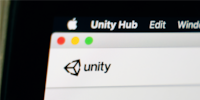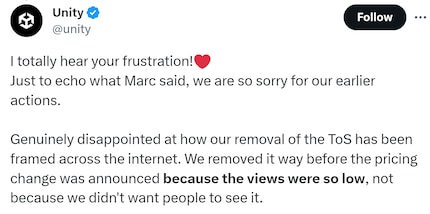
News + Trends
Game engine Unity annoys indie studios with bizarre payment structure
by Domagoj Belancic

The game engine Unity has cancelled its plans for a new payment model. The company was sharply criticised by various developer studios for the planned changes.
Unity cancels plans for a new payment model. The company had only announced a new monthly fee for its game engine on 12 September - the so-called "runtime fee". This would have been in addition to the existing licence fees and would have been based on the number of downloads of a game. Many indie studios saw their existence threatened by the changes. Some of them have already announced that they will switch to a different engine for their next project.
You can read all the details about the planned change here:
In a blog post, Marc Whitten, President of the "Unity Create" programme, apologises for the turbulent two weeks: "I'm sorry. We should have talked to more of you and considered more of your feedback before we announced our 'Runtime Fee'. (...) We have heard your concerns and are making changes to the announced policy."
The revised fee model differs significantly from the original plans. There is no longer a "runtime fee" for the free "Unity Personal" licence. In the original plan, Unity would have earned 20 cents per additional installation above a limit of 200,000 downloads. Many indie studios and free-to-play suppliers would not have been able to afford these additional costs. A nice bonus on top: those who use the free licence are no longer bound to the "Made with Unity" pop-up at the start of the game. In addition, the revenue limit for using the "Unity Personal" licence has been raised to 200,000 dollars. This was previously set at 100,000 dollars.
There is also good news for companies that generate more money and need to buy the "Unity Pro" or "Unity Enterprise" licences. The "Runtime Fee" will only be applied with the next Unity version. Games made with the current (or an older) version of Unity will not be subject to the new fees. This is a significant improvement on the previous plans. These would have envisaged the "runtime fee" being applied retroactively to all Unity versions.
Depending on the licence used, the runtime fee will not be applied to games that have generated less than one million dollars in revenue in the last twelve months. If a game is subject to the new fees, a studio can decide: Either it pushes 2.5 per cent of the monthly turnover or the monthly download costs incurred by the "runtime fee" to Unity. Both figures are collected and reported by the studios themselves. This is also a big difference to the original announcement. In that announcement, Unity would have tracked the download figures for games. The company never explained exactly how this would have worked technically.
In addition to the blog post, Whitten answers questions from the Community in a detailed Q & A:
A big point of discussion in the video is the deleted Unity terms of use on GitHub. In 2019, Unity set up a GitHub page on which they continuously posted changes to their terms of use. This page was completely deleted shortly before the announcement of the new "runtime fee". Many studios saw this step as an irrevocable breach of trust.
The "Unity Create" president apologises to the studios again in the video. It is important for Unity to regain the trust of the Community. He emphasises that users of the game engine must be able to rely on certain conditions when using Unity. Retroactive changes should no longer occur in future. The GitHub page has also been completely restored.
On X, formerly Twitter, the company confirms that there was no malicious intent behind the deletion of the terms of use. The page was removed because it "had too few views".

Gamesradar spoke to numerous developers following the announcement. The reactions range from scepticism to relief.
Many studios see the new conditions as an improvement - but compared to the disastrous "runtime fee", this was not difficult. Moreover, the problem is not the content of the payment models, but the loss of trust in the company. With the changes, Unity can prevent current games from being ported to new engines, but many studios can no longer imagine a long-term business relationship. The unnecessary complexity of the new model is also criticised. The fact that Unity does not want to let the idea behind the "runtime fee" die completely also gives rise to scepticism.
Some studios no longer see any reason to stay with Unity for future projects despite the changes. Although the costs of using Unity are now easier to plan, they are roughly the same as with the Unreal Engine. Compared to Unity, this scores with numerous high-end features and more stability.
Cover photo: Domagoj Belancic
My love of video games was unleashed at the tender age of five by the original Gameboy. Over the years, it's grown in leaps and bounds.
From the latest iPhone to the return of 80s fashion. The editorial team will help you make sense of it all.
Show all